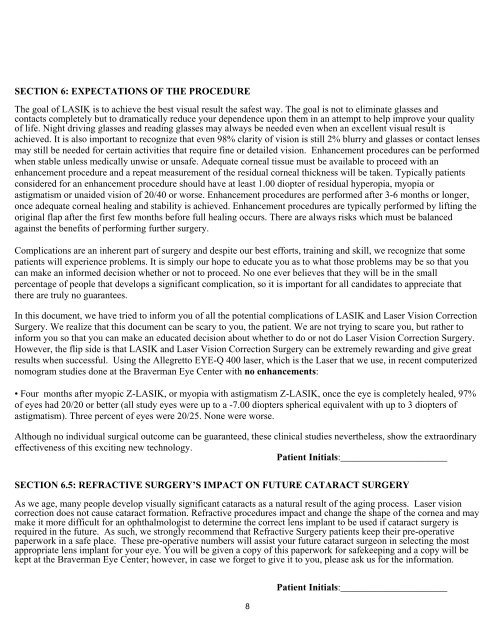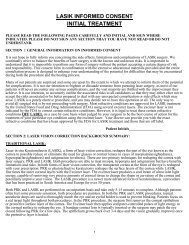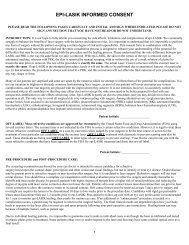lasik informed consent - initial - Braverman Eye Center
lasik informed consent - initial - Braverman Eye Center
lasik informed consent - initial - Braverman Eye Center
You also want an ePaper? Increase the reach of your titles
YUMPU automatically turns print PDFs into web optimized ePapers that Google loves.
SECTION 6: EXPECTATIONS OF THE PROCEDURE<br />
The goal of LASIK is to achieve the best visual result the safest way. The goal is not to eliminate glasses and<br />
contacts completely but to dramatically reduce your dependence upon them in an attempt to help improve your quality<br />
of life. Night driving glasses and reading glasses may always be needed even when an excellent visual result is<br />
achieved. It is also important to recognize that even 98% clarity of vision is still 2% blurry and glasses or contact lenses<br />
may still be needed for certain activities that require fine or detailed vision. Enhancement procedures can be performed<br />
when stable unless medically unwise or unsafe. Adequate corneal tissue must be available to proceed with an<br />
enhancement procedure and a repeat measurement of the residual corneal thickness will be taken. Typically patients<br />
considered for an enhancement procedure should have at least 1.00 diopter of residual hyperopia, myopia or<br />
astigmatism or unaided vision of 20/40 or worse. Enhancement procedures are performed after 3-6 months or longer,<br />
once adequate corneal healing and stability is achieved. Enhancement procedures are typically performed by lifting the<br />
original flap after the first few months before full healing occurs. There are always risks which must be balanced<br />
against the benefits of performing further surgery.<br />
Complications are an inherent part of surgery and despite our best efforts, training and skill, we recognize that some<br />
patients will experience problems. It is simply our hope to educate you as to what those problems may be so that you<br />
can make an <strong>informed</strong> decision whether or not to proceed. No one ever believes that they will be in the small<br />
percentage of people that develops a significant complication, so it is important for all candidates to appreciate that<br />
there are truly no guarantees.<br />
In this document, we have tried to inform you of all the potential complications of LASIK and Laser Vision Correction<br />
Surgery. We realize that this document can be scary to you, the patient. We are not trying to scare you, but rather to<br />
inform you so that you can make an educated decision about whether to do or not do Laser Vision Correction Surgery.<br />
However, the flip side is that LASIK and Laser Vision Correction Surgery can be extremely rewarding and give great<br />
results when successful. Using the Allegretto EYE-Q 400 laser, which is the Laser that we use, in recent computerized<br />
nomogram studies done at the <strong>Braverman</strong> <strong>Eye</strong> <strong>Center</strong> with no enhancements:<br />
• Four months after myopic Z-LASIK, or myopia with astigmatism Z-LASIK, once the eye is completely healed, 97%<br />
of eyes had 20/20 or better (all study eyes were up to a -7.00 diopters spherical equivalent with up to 3 diopters of<br />
astigmatism). Three percent of eyes were 20/25. None were worse.<br />
Although no individual surgical outcome can be guaranteed, these clinical studies nevertheless, show the extraordinary<br />
effectiveness of this exciting new technology.<br />
Patient Initials:______________________<br />
SECTION 6.5: REFRACTIVE SURGERY’S IMPACT ON FUTURE CATARACT SURGERY<br />
As we age, many people develop visually significant cataracts as a natural result of the aging process. Laser vision<br />
correction does not cause cataract formation. Refractive procedures impact and change the shape of the cornea and may<br />
make it more difficult for an ophthalmologist to determine the correct lens implant to be used if cataract surgery is<br />
required in the future. As such, we strongly recommend that Refractive Surgery patients keep their pre-operative<br />
paperwork in a safe place. These pre-operative numbers will assist your future cataract surgeon in selecting the most<br />
appropriate lens implant for your eye. You will be given a copy of this paperwork for safekeeping and a copy will be<br />
kept at the <strong>Braverman</strong> <strong>Eye</strong> <strong>Center</strong>; however, in case we forget to give it to you, please ask us for the information.<br />
8<br />
Patient Initials:______________________






